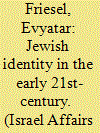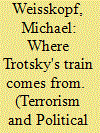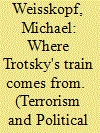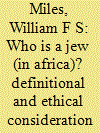| Srl | Item |
| 1 |
ID:
189414


|
|
|
|
|
| Summary/Abstract |
The social and cultural integration of the Jews into Western society was a central paradigm of modern Jewry. Presently, ideological changes in sectors of ‘progressive’ Western society regarding the Jewish state and the Jews, as well as political and cultural tendencies in Israel, are unsettling the parameters of that paradigm, bringing up new tensions between non-Jews and Jews and changing Jewish profiles. Such multifaceted developments should be understood in the framework of the broader tendencies in Jewish history.
|
|
|
|
|
|
|
|
|
|
|
|
|
|
|
|
| 2 |
ID:
123057


|
|
|
|
|
| Publication |
2013.
|
| Summary/Abstract |
The article discusses the autobiography of Leon Trotsky (published by Bronshtein in 1930) from a psychoanalytic angle. Trotsky the revolutionary leader was a key figure in the October 1917 coup, and a statesman second only to Lenin in the early years of the Soviet regime. The article concentrates on Trotsky's departure from Judaism and evolution toward Christianity. The author sees this drift as parallel to Trotsky's transition from the Jewish bourgeoisie to the Russian proletariat. The next step in this process of denationalization would be Trotsky's embracing of world revolution. Bolshevik terror became for Trotsky a form of emancipation from his personal past.
|
|
|
|
|
|
|
|
|
|
|
|
|
|
|
|
| 3 |
ID:
124917


|
|
|
|
|
| Publication |
2013.
|
| Summary/Abstract |
The article discusses the autobiography of Leon Trotsky (published by Bronshtein in 1930) from a psychoanalytic angle. Trotsky the revolutionary leader was a key figure in the October 1917 coup, and a statesman second only to Lenin in the early years of the Soviet regime. The article concentrates on Trotsky's departure from Judaism and evolution toward Christianity. The author sees this drift as parallel to Trotsky's transition from the Jewish bourgeoisie to the Russian proletariat. The next step in this process of denationalization would be Trotsky's embracing of world revolution. Bolshevik terror became for Trotsky a form of emancipation from his personal past.
|
|
|
|
|
|
|
|
|
|
|
|
|
|
|
|
| 4 |
ID:
165230


|
|
|
|
|
| Summary/Abstract |
In recent decades, the fulcrum of African Jewry has shifted from long-established Ethiopian communities to emerging ones in West and Central Africa. This transition from “old” to “new” expressions of Judaism in Africa reanimates the question, “Who is a Jew?” The matter is problematized by the existence of multiple and diverse communities who purport Israelite lineage but eschew normative Judaism. This article offers a “concentric circles” model to bring conceptual and theological clarity to this issue. The outer circle or ring includes African “tribes” (as the term is used by African themselves) that claim ancient Hebrew lineage but still subscribe to institutionalized Christianity (Protestant or Catholic) or indigenous belief systems (animist or ancestral), or a combination of these. A middle circle or ring encompasses groups that have modified their practices and beliefs to resemble Jewish or Israelite religion but in fundamentally non-normative ways (e.g., practicing priestly sacrifice or retaining Jesus Christ as a Messianic touchstone). The core ring represents those African communities that do adopt normative Judaism, albeit with Africanized accretions. Some scholarly consensus regarding the legitimacy of wide-ranging claims to Jewish identity in Black Africa is critical to the analytical and ethical integrity of the study of African Judaism.
|
|
|
|
|
|
|
|
|
|
|
|
|
|
|
|